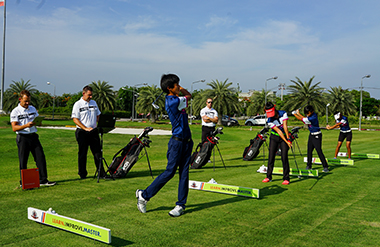Below is some information and research regarding the influence of Mindfulness in sport.
PHYSIOLOGICAL CHANGES
Mental preparation can be optimized through properly implemented, progressive mindfulness training, and optimal mental preparation may enhance physiological readiness. Mindfulness-based interventions have resulted in numerous physiological effects such as decreased pre-competition salivary cortisol associated with decreased pre-competition stress (John, Verma, & Khanna, 2011), decreased resting heart rate (Hewett, Ransdell, Gao, Petlichkoff, & Lukas, 20011), and decreased pain sensitivity (Kingston, Chadwick, Meron, & Skinner, 2007; Zeiden, Gordon, Merchant, & Goolkasian, 2010). These physiological effects may enhance sport performance and may also decrease risk of athlete burnout. Mindfulness training may also help athletes improve concentration and reduce anxiety, which may lead to enhanced athletic performance (Bernier et al., 2009; Gardner & Moore, 2004).
By regulating reactions to potential stressors, the perceived stress is decreased, and by developing an awareness of their breathing, mindful individuals may have calming effects on their sympathetic nervous systems, thus decreasing their resting heart rates (Hewett et al., 2011). A lower resting heart rate can lead to improved physical performances due to more efficient heart function and greater endurance, as well as lower perceived exhaustion. Additionally, mindful individuals may become aware of their ability to alter their sympathetic nervous systems (Hewett et al., 2011), which may lead to a greater sense of control, thus reducing anxiety.
MENTAL
Mindful athletes may have heightened awareness and acceptance of internal and external stimuli that may allow them to devote their attention and energy to their athletic performances (Moore, 2009).
Mindfulness, or non-judgmental present-moment awareness, may help athletes improve their concentration, thus helping them improve their sports performances (Bernier, Thienot, Codron, & Fournier, 2009; Gardner & Moore, 2004).
Mindfulness, the non-judgmental awareness or focus on the present moment (Kabat-Zinn, 1994; Schmidt & Kupper, 2012; Ulmer, Stetson, & Salmon, 2010), allows athletes to experience and reflect on each moment without viewing and reacting to the situation or moment as positive or negative (Bernier et al., 2009; Gardner & Moore, 2004; Thompson, Kaufman, De Petrillo, Glass, & Arnkoff, 2011).
Mindfulness also allows athletes to become aware of personal thoughts, feelings, and other internal stimuli and encourages athletes to focus on personal values or processes of sport related skills and game strategies instead of focusing on performance outcomes (Pineau, Glass, & Kaufman, 2014).
Awareness and acceptance of the present moment may allow athletes to focus less on negative thoughts, which may provide athletes with more energy and focus for the athletic tasks at hand (Pineau et al., 2014).
Mindfulness allows individuals to concentrate their attention on the present moment and not dwell on the past nor worry about the future. Additionally, instead of changing or stopping unwanted thoughts, mindfulness teaches athletes to play with such thoughts (Bernier et al., 2009; Gardner & Moore, 2004). This is important for athletes because concern about past or future performances may prevent them from performing their best or from enjoying their sport.
References
- Bernier, M., Thienot, E., Codron, R., & Fournier, J. F. (2009). Mindfulness and acceptance approaches in sport performance. Journal of Clinical Sport Psychology, 4, 320 333.
- Gardner, F. L., & Moore, Z. E. (2004). A Mindfulness-Acceptance-Commitment-Based approach to athletic performance enhancement: Theoretical considerations. Behavior Therapy, 35, 707-723.
- Hewett, Z. L., Ransdell, L. B., Gao, Y., Petlichkoff, L. M., & Lucas, S. (2011). An examination of the effectiveness of an 8-week Bikram yoga program on mindfulness, perceived stress, and physical fitness. Journal of Exercise Science & Fitness, 9(2), 87-92.
- John, S., Verma, S. K., & Khanna, G. L. (2011). The effect of mindfulness meditation on HPA-Axis in pre-competition stress in sports performance of elite shooters, National Journal of Integrated Research in Medicine, 2(3), 15-21.
- Kabat-Zinn, J. (1994). Wherever you go, there you are: Mindfulness meditation in everyday life. New York: Hyperion.
- Kingston, J., Chadwick, D., Meron, C., & Skinner, T. C. 2007. A pilot randomized control trial investigating the effect of mindfulness practice on pain tolerance, psychological well-being, and physiological activity. Journal of PsychosomaticResearch, 62(3), 297-300.
- Lemyre, P.-N., Roberts, G. C., Stray-Gunderson, J. (2007). Motivation, overtraining, and burnout: Can self-determined motivation predict overtraining and burnout in elite athletes? European Journal of Sport Science, 7(2), 115-126.
- Mamassis, G., & Doganis, G. (2004). The effects of a mental training program on juniors’ pre-competitive anxiety, self-confidence, and tennis performance. Journal of Applied Sport Psychology, 16(2), 118-137.
- Moore, Z. E. (2009). Theoretical and empirical developments of the Mindfulness-Acceptance-Commitment (MAC) approach to performance enhancement. Journal of Clinical Sport Psychology, 4, 291-302.
- Pineau, T. R., Glass, C. R., & Kaufman, K. A. (2014). Mindfulness in sport performance. In A. le, C. T. Ngnoumen, & E. J. Langer (Eds.), The Wiley Blackwell handbook of mindfulness (Vol. II, pp. 1004-1033). Chichester, U.K.: John Wiley & Sons.
- Schmidt, S., & Kupper, Z. (2012). German contributions to mindfulness research, part 1: Context and concept of mindfulness. Mindfulness, 1-3.
- Stavrou, N. A., Jackson, S. A., Zervas, Y., & Karteroliotis, K. (2007). Flow experience and athletes' performance with reference to the orthogonal model of flow. Sport Psychologist, 21(4), 438-457.
- Thompson, R. W., Kaufman, K. A., De Petrillo, L. A., Glass, C. R., & Arnkoff, D. B. (2011). One-year follow-up of Mindful Sport Performance Enhancement (MSPE) with archers, golfers, and runners. Journal of Clinical Sport Psychology, 5, 99-116.
- Ulmer, C. S., Stetson, B. A., & Salmon, P. G. (2010). Mindfulness and acceptance are associated with exercise maintenance in YMCA exercisers. Behaviour Research and Therapy, 48(8), 805-809.
- Zeiden, F., Johnson, S. K., Diamond, B. J., David, Z., & Goolkasian, P. (2010). Mindfulness meditation improves cognition: Evidence of brief mental training. Consciousness and Cognition, 19, 597-605.


